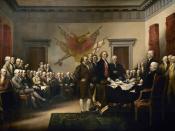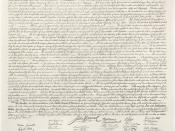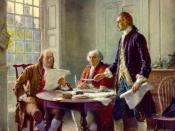It was only with great courage and perseverance that the fifty-six delegates of the Second Continental Congress successfully and unanimously approved the Declaration of Independence yesterday, July 4, 1776. The document was, in fact, adopted on the second of July, but editing continued through the fourth.
Earlier this year, delegate Richard Henry Lee introduced to Congress a resolution calling for the thirteen colonies to be "free and independent states, absolved of all allegiance to the British crown." Two of the leading men in the drafting of the document representing the idea of the Lee's resolution, John Adams of Massachusetts and Thomas Jefferson of Virginia, both of whom were interviewed by the Philadelphia Gazette, provided some insight as to why this cause meant enough to them to willingly risk their lives and future prosperity.
John Adams related to the Philadelphia Gazette the events leading up to the approval of the Declaration.
By day's end of June 7th, there was little consensus as to whether such a bold declaration should be considered, but Adams felt that such an idea should be drafted for discussion by Thomas Jefferson, the soft-spoken yet fascinatingly brilliant delegate of Virginia, stating that Jefferson was easily "ten times the writer" he was. Jefferson supposedly declined at first, but Adams persuaded him by admitting that his own poor popularity, resulting from his assertiveness, he believed, would affect the regard in which the draft would be received.
By the twenty-eighth of June, both Benjamin Franklin (a delegate from Pennsylvania) and Adams had slightly modified and reworded Jefferson's written work, which was already eloquent, and the committee of five (which also included Roger Sherman of Connecticut and Robert R. Livingston of New York) of which they were a part approved it. Adams vigorously defended the work during sessions of Congress, (more...


